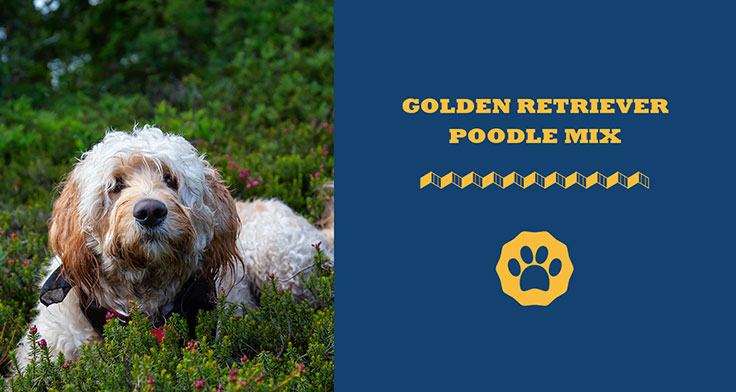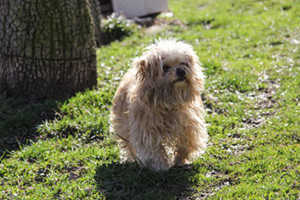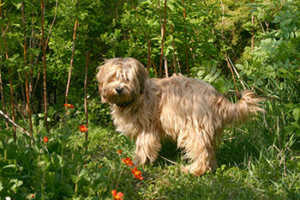Updated: March 11th, 2023

Goldendoodles are hybrid dogs that are a crossbreed of the golden retriever and the poodle. They are also known as a designer breed,, as they are bred with the aim of producing the lovable qualities of the golden retrievers and the poodles.
These dogs are loving, kind, and affectionate, making them great family pets. They get along well with strangers and are therefore a great choice for new and experienced dog owners alike.
Above all else, though, they are popular for their cuddly and gorgeous looks. Therefore, if you are searching for a loving family pet, the Goldendoodle is a breed that is worth considering.
But before you make a decision to acquire one, you will need to understand the breed, its temperament, how to care for them, potential health issues, and more. Here is everything you needed to know about this golden retriever poodle mix.
History Of The Goldendoodle

The first recorded cases of intentional breeding between golden retrievers and poodles happened in the late 60s.
However, it wasn’t until the 1990’s that the Goldendoodle was officially considered to be a hybrid breed. After breeders saw the success of the Labradoodle, they started breeding poodles with golden retrievers.
The main goal of the crossbreeding was to create a breed that maintained thethe low-dander and low-shedding traits associated with the poodle and had the friendly nature and intelligence that is associated with the golden retriever.
Since the Goldendoodle breed is still young, most of the puppies available on the market are the result of first-generation breeding. There are also, however, many cases of breeding between Goldendoodles.
Check out this article for more information on the different generational classes of goldendoodles.
Goldendoodle Size
How big do Goldendoodles get? Well, since they are not a result of multigenerational breeding, they come in varying sizes. Their sizes range from small to large depending on the specific poodle variant the golden retriever gets crossed with.
However, their sizes can be categorized into three main standards. These are miniature, small, and large. The miniature Goldendoodle is a result of mixing the golden retriever with the toy poodle. Generally, these dogs reach heights of around 13 to 20 inches. Their weight ranges from 15 to 35 pounds.
By comparison, the size of a small standard Goldendoodle ranges from 17 to 20 inches, while their weight ranges from 40 to 50 pounds. Finally, if you are wondering how big standard Goldendoodles are, the large standards have an average height of 20 to 24 inches. Their weight ranges from 50 to 90 pounds.
Goldendoodle Temperament
Goldendoodles can inherit their temperaments from one or both of their parents. In most cases, they are obedient, intelligent, and loving. Not only do they love people, but they also get along very well with other pets. They are especially gentle and patient with children, making them great family pets.
The hybrid dog breed gets its gentle nature from the side of the golden retriever. Golden retrievers are good with kids and are very careful with toddlers and infants. They are also very patient with growing kids since they are extremely affectionate and skilled at socializing.
Rather than chasing people, Goldendoodles are usually laid-back. They are often recommended for first-time owners as well as timid pet owners. But their friendliness can also be a hindrance to some, as it means they do not make good watchdogs and guard dogs.
Instead of providing protection, they are more likely to befriend strangers. Additionally, since they are highly social animals, they do well with large families but do not fare as well in homes where they are left alone for a long time. For people who live in apartments, the smaller goldendoodles can make for great companions.
All things considered, though, a Goldendoodle is still a mixture of two different dog breeds, and therefore, you cannot predict their personality. At times, they will exhibit a more poodle-like personality, while other times, you will get more of the golden retriever’s traits.
Goldendoodle Trainability
Goldendoodles are easy to train, as they have one of the most advanced brains in dogs, which they inherited from both parents. Like any other breed, they do better with positive reinforcement training and being rewarded with treats for good behavior.
Young Goldendoodle puppies can quickly learn basic obedience and tricks through socialization and early training. After you have gotten the obedience basics, you can move on to agility training, dock diving, and more.
Do Goldendoodles Shed?

A big reason why Goldendoodles are so popular is that they are considered to be hypoallergenic. However, no breed is truly 100% guaranteed to not trigger allergic reactions, and that includes both of the Goldendoodle’s parent breeds. When I say this designer breed is hypoallergenic, what I mean is that it sheds less than most other breeds on average and doesn’t produce a lot of dander, the main cause of allergies.
Even with their minimal shedding, Goldendoodles require regular and consistent grooming. You will need to take them to a professional groomer every 6 to 8 weeks to keep their long, curly coats under control.
However, they will not need much bathing in between their grooming sessions. In fact, dog experts advise against frequent bathing of Goldendoodles as they can develop dry skin as a result. Therefore, you should only bathe this designer breed when they are actually dirty or smelly.
The curlier the coat appears, the more often you will need to brush your Goldendoodle. But generally, they will need to be brushed daily so as to avoid matting. However, if their coat is more straight or they have a short hairdo, they might only need a few weekly brushing sessions.
How To Care For The Goldendoodle
No matter the size of the Goldendoodle, they will need about one hour of physical activity every day. This could be in the form of brisk walks around the neighborhood, a run at the dog park, or a backyard training session.
As I noted earlier, these dogs need regular social interaction and shouldn’t be left alone for long hours. Otherwise, they may develop separation anxiety or show undesirable and destructive behaviors such as barking or digging.
To ensure good behavior, your Goldendoodle will need plenty of attention and socialization throughout its lifespan.
Goldendoodle Health
Hybrid breeds are generally considered to be healthy due to the diversity of their genes. Generally, the golden retriever and poodle mix creates very healthy dogs, especially when they are bred by an ethical breeder who cares about their health. However, being knowledgeable about their health conditions can still be helpful. This is because, like any other dog breed, they are susceptible to various health conditions commonly suffered by their parent breeds.
Because they love playing in the water, they are particularly prone to ear infections compared to other dogs. Their large, floppy ears can harbor moisture, so it’s advisable to clean their ears thoroughly after a bath or any other water activity. Other health conditions that may affect goldendoodles include:
- Hip Dysplasia. This condition is usually inherited but can at times also be caused by malnutrition. The condition involves the thigh bone failing to fit properly into the hip joint. It’s usually marked by pain and limping in the rear legs. It’s best to have your furry friend checked for hip dysplasia during every veterinary visit.
- Elbow dysplasia. Just like hip dysplasia, this condition is degenerative. It is believed to be a result of rapid growth that results in weakened and malformed bones. The condition could lead to arthritis or lameness in older dogs.
- Luxating patellas. Commonly referred to as slipped stifles, this condition is marked by the dislocation of the bone at the joint, usually the hind leg.
- Progressive retinal atrophy. This is an eye condition that causes the retina to deteriorate gradually. It usually begins with the dog becoming night-blind, but they later also lose their sight during the day. It’s advisable to have an eye and ear checkup during every appointment with your veterinarian.
- Allergies. Just like other dog breeds, allergies are a common challenge for goldendoodles. Their allergies could be caused by food, contact with topical substances, and allergens such as dust, pollen, and mildew.
- Cancer. Different types of cancers can be passed down from the parents to the hybrid breed.
There are also other conditions that goldendoodles may be susceptible to. While Goldendoodles have beautiful coats and colors, they can develop certain skin conditions. Therefore, you should request a health clearance certificate from the breeder before acquiring a Goldendoodle. The breeder should carry out the right tests and give the necessary documentation when you buy a Goldendoodle puppy.
It’s also important to do your research before working with any breeder. Ensure that you avoid breeders who sell multiple mixed breeds, are hard to reach, or don’t allow you to meet the parents of the Goldendoodle puppies.
FAQs About Goldendoodles
How long do Goldendoodles live?
The average Goldendoodle lifespan is typically between 10 and 15 years.
Final Thoughts On The Goldendoodle
With their easy-going temperaments, Goldendoodles are among the most popular breeds in America. The dogs are usually sociable with kids and make good family pets. However, before you acquire one, be sure you understand their temperament, care, health conditions, and other such details.
Before you adopt a Goldendoodle, keep these things in mind to ensure you are able to meet their care needs:
- Goldendoodles require at least one hour of exercise each day
- They don’t do well when left alone for long periods of time
- They require regular grooming to keep their coats healthy
Fortunately, in this article, we have provided all the information you will need to take good care of your golden retriever poodle mix. Hopefully, it has proven to be helpful and will help keep your furry friend wagging their tail for years to come.



